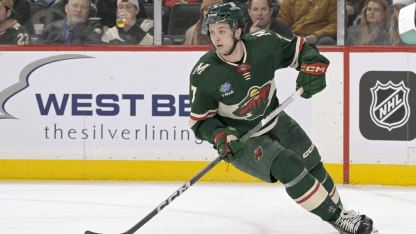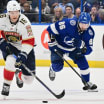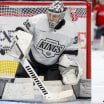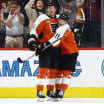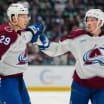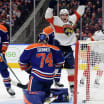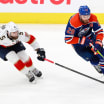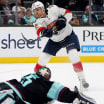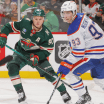Brock Faber knew he had played a lot.
The Minnesota Wild defenseman logged 2,047:53 of ice time last season, fifth among NHL skaters. Not only did he rank first among NHL rookies, but he also played 287:03 more than any other rookie. That’s the equivalent of about 4 3/4 regulation games.
He didn't know this, though. According to NHL EDGE, the League's Puck and Player Tracking system, he covered 273.10 miles, putting him in the 96th percentile of NHL skaters.
"Wow," he said.
It was a feat of efficiency and endurance, and now the 22-year-old is averaging even more ice time three games into his second NHL season. He was at 24:58 last season, sixth among NHL skaters. He’s at 26:25 this season, fourth among NHL skaters, entering the Wild's game at the St. Louis Blues on Tuesday (7:30 p.m. ET; ESPN).
"He's a hell of a player, and he's going to be for a long time, just with the way he plays and how poised he is out there," said Chicago Blackhawks center Connor Bedard, the only player who finished ahead of Faber last season in voting for the Calder Trophy, which goes to the NHL rookie of the year.
"I think that's a big thing for me. It seems like he's been in the League for a long time. It was fun to get to play against him and watch him. Yeah, it's going to be cool to see what he does in the coming years."
Faber spent 2020-23 at the University of Minnesota, never playing more than 38 games in a season for the Golden Gophers, generally performing on Friday and Saturdays due to the lighter college schedule.
Then he stepped into the NHL and took on a heavy workload during the 82-game grind thanks in part to injuries to defenseman Jared Spurgeon, who was limited to 16 games. Rookie wall? He burst through it.
He played 33:25 -- more than any other skater played in a game last season -- in a 4-3 overtime win against the Montreal Canadiens on Dec. 21, scoring a power-play goal in the third period and assisting on the OT goal.
"After that game, I feel like that kind of lasted on me for a couple weeks, where I was pretty gassed," he said. "… It was definitely a little soreness, for sure."
Faber had no points and averaged 24:43 over his next six games. But he recovered and had 31 points (six goals, 25 assists) and averaged 25:15 for his final 45.
He finished with 47 points (eight goals, 39 assists) in 82 games, tied for second in scoring among rookies, while leading rookies with 150 blocked shots. New Jersey Devils defensemen Luke Hughes also had 47 points (nine goals, 38 assists) in 82 games. Bedard had 61 points (22 goals, 39 assists) in 68 games.
